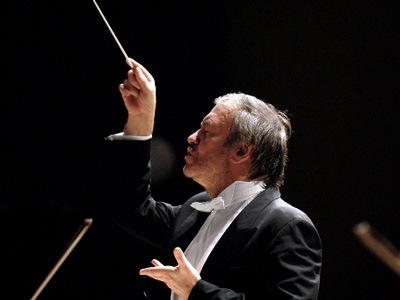
By ANDREW POWELL
Published: April 1, 2014
MUNICH — In every book on time management, there is a chapter about giving your work to someone else. Delegation, they say, is a virtue: an assistant exercises new authority and the delegator accomplishes other tasks, perhaps in other places. Maybe in another country. Or two.
Take Valery Gergiev, incoming Chefdirigent of the Munich Philharmonic. He delegates like a pro, arming répétiteurs and conducting assistants — many of them from St Petersburg’s Mariinsky Theater — with preparatory guidelines to deliver “Gergiev” interpretations on a minimum of Gergiev time. This way, the Russian’s branded, in-person artistry reaches more audiences in more cities. Call it the productization of conducting.
Last December, leading up to and including an MPhil program here, Gergiev conducted a choral concert, three operas, and four Stravinsky works, with three different orchestras in three countries, all in one week.
It was quite a feat. It was also, inevitably, a week of headaches, as the controlling artist jumped between scores on a near-daily basis. Featured: a postponement, a cancellation, anxious last-minute rehearsing, an opera company’s embarrassment, and, in Munich at least, shallow musical results.
The conductor’s devotion to the weightiest project of the week, in Warsaw, offers a clue about how much of what audiences hear in a “Gergiev” performance reflects his work.
Teatr Wielki had hired the Moscow-born conductor for a new production of a Tchaikovsky-Bartók double bill premiering on Dec. 13. Directed by Mariusz Treliński, the film noir versions of Iolanta and A kékszakállú herceg vára were a joint venture with the Metropolitan Opera, where they arrive next January under Guess Who’s baton.
The assignment came with hurdles, given that the opera company’s orchestra was little accustomed to Gergiev’s ways, the principal singers were mostly new to their roles, the compositional styles of the two pieces were unrelated, and the bill involved the Russian and Hungarian languages in performance by mostly Polish musicians.
All this considered, not delegating might have seemed the better part of valor. Indeed, if hearsay is accurate, the week was originally planned at a slightly less frenetic level of activity: just the Warsaw double bill and (on Dec. 18) the Stravinsky pieces in Munich.
The parties understood that of the Warsaw rehearsals Gergiev would lead only the final dress, on Dec. 11. Beyond the premiere, the hearsay has it that he was also to conduct the second performance, on Dec. 15, before heading to Munich. For the remaining dates of the brief run, Dec. 17 and 19, the Poles had engaged a second maestro, young Bassem Akiki.
The hearsay is credible because the non-updated website of Akiki, as recently as today (April 1, 2014), lists the two dates alone, and, when asked about the original slate for Dec. 15, Teatr Wielki did not deny the suggestion that the Russian conductor was at first scheduled.
But Gergiev gave Warsaw much less of himself even than this modest arrangement (Dec. 11, 13 and 15), and in Munich he appeared tired, possibly weakening the Dec. 18 concert. He conducted Teatr Wielki’s Dec. 13 premiere, and he flew to Munich on Dec. 16 to prepare the Stravinsky, only not from Warsaw.
“Unexpected circumstances did not allow maestro Gergiev to lead” the final dress rehearsal on Dec. 11, stated Teatr Wielki in an email response to questions (confirming a separate part of the hearsay), and so it was postponed to Dec. 12, when Gergiev was available. Besides distress for the cast, this change, according to the hearsay at least, caused the cancellation of an unrelated concert on Dec. 12.
The cast affected was: Tatiana Monogarova as Iolanta, Sergei Skorokhodov as Vodyemon, Mikolaj Zalasiński as Robyert, Alexei Tanovitski as Ryenye, Nadja Michael as Judit, and Gidon Saks as Kékszakállú.
“It is absolutely not customary for Teatr Wielki to schedule dress rehearsals one day before a premiere,” wrote the company.
Nor did Gergiev conduct the second performance of Treliński’s double bill. That fell to Akiki, even as company managers were trumpeting the participation of the celebrated conductor.
Instead he bolted, apparently with permission, for St Petersburg and rapid-switch programs at his own Mariinsky Theater: on Dec. 14 the Verdi Requiem and on Dec. 15 La traviata, both necessarily rehearsed by other hands. It was from the Russian city that he flew here.
Warsaw’s astoundingly patient company provided context for Gergiev’s arrangement, pointing out that “the process of rehearsing” (before the final dress) was the responsibility of a Gergiev assistant who “was in constant contact with” the boss. And, in a sign that any change of plan had been agreed: “Maestro Gergiev fulfilled his duties for Teatr Wielki.”
Meanwhile in Munich, normally communicative spokespeople grew taciturn, conceivably out of embarrassment about what they sensed was artistic dissemblance. Still unanswered by the publicly run MPhil are these easy questions:
— How many hours of rehearsal took place for the Dec. 18 Stravinsky program? How many were with Gergiev?
— What does the MPhil normally expect of a guest conductor, in number of days with the musicians and number of rehearsals?
Then again, the Munich Philharmonic has a long stake in this conductor (until 2020) and a bigger problem. He has become hot-to-handle due to his support for Vladimir Putin and his seeming confusion of homosexuality with pedophilia. On Dec. 17, amid Stravinsky rehearsals, he was grappling with testy questions at a news conference about these matters.
And the Dec. 18 Stravinsky concert? It brought fine musicianship with more than a hint of interpretive emptiness. Being a guest here, Gergiev can get away with such perceptions of disengagement, but he must steel himself for heightened subscriber scrutiny once he takes over.
Photo © Alexander Shapunov
Related posts:
Christie Revisits Médée
Gergiev, Munich’s Mistake
Maestro, 62, Outruns Players
Gergiev Undissuaded
Stravinsky On Autopilot


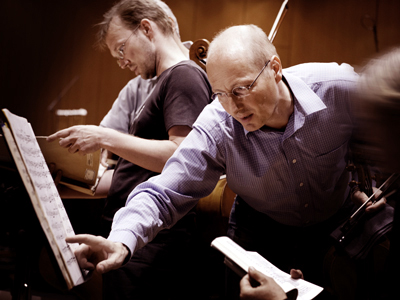
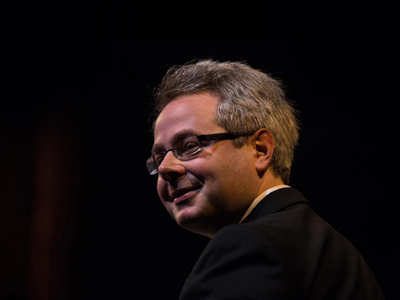

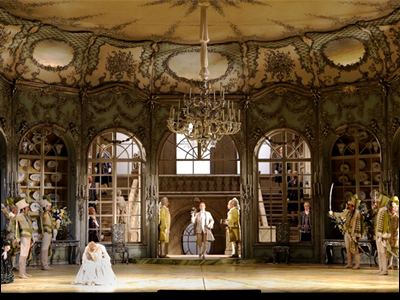

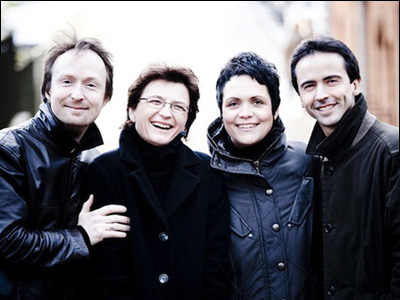
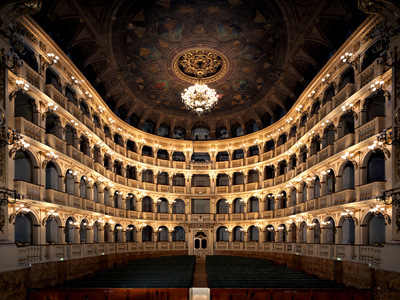
Gergiev, Munich’s Mistake
Wednesday, April 9th, 2014By ANDREW POWELL
Published: April 9, 2014
MUNICH — Not a week goes by here now without media mention of Valery Gergiev. The musical friend of Vladimir Putin and, more to the point, high-profile employee-to-be of the City of Munich inspires comment even in modest suburban newspapers. Many want his alarmingly long contract (2015–20) shredded.
But the Russian maestro was already a rotten choice as Chefdirigent of the tax-payer-funded, city-run Munich Philharmonic before Putin upset Pink List politicians over human rights and the Green Party over Crimea.
His repertory limitations, his work habits and his first loyalties all portend a discordant, creatively stunted tenure during which Munich, despite its €800,000-a-year* wage, has no hope of being the artist’s top priority. If not shredded, the contract of Feb. 2013 should certainly be adjusted.
Gergiev is globally known from his base at St Petersburg’s Mariinsky Theater, where he operates a network of répétiteurs and conducting assistants who extend brand “Gergiev” beyond the physical and temporal limits of one person.
Seven days ago, for instance, he entered a principal guest conductor agreement (pictured) with Astana Opera, the expensively housed company of Nursultan Nazarbayev in the flat and flashy Kazakh capital.
Munich’s old and Astana’s new money follows Gergiev earnings at the London Symphony Orchestra, where his stint as principal conductor (2007–15) resembles good preparation for the job here.
But London’s one-night, one-program pattern suits the Russian’s lickety-split scheduling better than Munich’s (American-style) weekly program iterations. Example: he is this week able to dart to New York for a Strauss concert between two different LSO Scriabin programs three days apart.
As one MPhil insider earnestly phrased it last December, peripatetic Gergiev “must reinvent himself” so that he can stay in one place, with one program and one group of musicians, for a whole workweek, build partnerships through rehearsals he himself leads, and mine the interpretive depths.
Good luck with that. And the reinventing would need to extend to repertory: Munich concertgoers enjoy their Slavic diversions but expect passionate leadership in Beethoven, Brahms and Bruckner. Alas, in 25 years as a star, Gergiev has acquired no reputation in these composers. Ditto for Haydn, Mozart, Schubert, Schumann and Mendelssohn.
“It’s political,” everyone says, when asked why Gergiev was chosen. They mean he was chosen by city politicians — not friends of Putin, of course, but people whose collective knowledge and consensus thinking permit little beyond the purchase of a big name, which Gergiev undeniably is.
In their wisdom, in 2009, they “lost” the MPhil’s hot-property Generalmusikdirektor Christian Thielemann, and followed up in 2010 by replacing him with the jaded Lorin Maazel (for 2012–15). Decline has followed.
The politicians do not decide unaided, however. A consulting board called the Philharmonische Rat liaises between the orchestra’s Intendant Paul Müller and Munich’s city council, which approves budgets and major contracts. The Rat includes councilors, orchestra members, Müller, and Hans-Georg Küppers, the city’s Kulturreferent. If nothing else, processes are peaceful. The recent difficulties in Minneapolis and San Diego cannot be imagined here.
Ironically, while Rat members can speak freely, Gergiev is expected to constrain his speech — not weigh in on matters like Crimea that needn’t concern a Moscow-born Ossetian based in St Petersburg — and acquire the diplomatic tact of a City of Munich employee, a world-roaming cultural ambassador whose every move and view will reflect on Munich, Bavaria and Germany.
Predictably he hasn’t. By hailing the Crimea change, even in his current status as an MPhil guest, he may have done more to curtail his Munich future than any problem of scheduling or repertory weakness could have.
The Green Party on Mar. 27 forced instructions to Küppers and Müller: chat with the maestro during his next visit, bitte, and illuminate the boundary between free speech and employee discretion.
They can try. Gergiev is in town next month with his beloved Mariinsky Orchestra. More productive, though, would be a chat that dilutes the publicly signed Chefdirigent deal into a guesting plan like Astana’s. Time remains on Maazel’s contract to research and court a more suitable replacement, allowing Gergiev to remain Gergiev, and Munich to savor the scores he leads best. Without the negative attention.
[*The salary reportedly paid to Christian Thielemann, whose title indicated a slightly loftier position. The incumbent, Lorin Maazel, is Chefdirigent, as was James Levine before Thielemann.]
Photo © Astana Opera
Related posts:
Jansons! Petrenko! Gergiev!
Gergiev Undissuaded
Maestro, 62, Outruns Players
Concert Hall Design Chosen
Stravinsky On Autopilot
Tags:Astana Opera, Christian Thielemann, Commentary, Green Party, Hans-Georg Küppers, London Symphony Orchestra, Lorin Maazel, Mariinsky Orchestra, Mariinsky Theater, München, Münchner Philharmoniker, Munich, Munich Philharmonic, Nursultan Nazarbayev, Paul Müller, Pink List, St Petersburg, Valery Gergiev, Vladimir Putin
Posted in Munich Times | Comments Closed